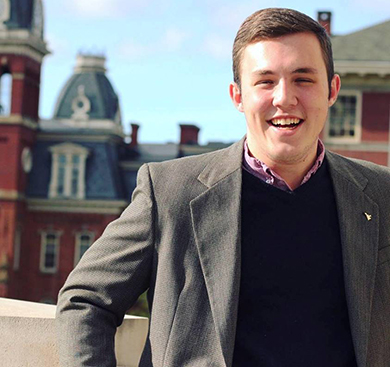
Blake Humphrey
Less than a week after the neo-Nazi rallies in Charlottesville, Virginia, USC Shoah Foundation received a call from Blake Humphrey, student body president of West Virginia University. How could he work with USC Shoah Foundation to speak out against this blatant display of hatred and bigotry?
In between the excitement and responsibilities of his first week back on campus for the fall semester, Humphrey worked with USC Shoah Foundation Teaching Fellow Sara Brown to write a passionate and thoughtful blog post about the importance of standing up against hate and how USC Shoah Foundation’s IWitness resources can help teach tolerance.
“The time is now. If I’m not going to speak up now, when am I going to speak up?” Humphrey said. “Being vocal when you’re in a position of leadership is so important.”
Humphrey first heard of USC Shoah Foundation while on a trip to Poland, visiting Auschwitz and Majdanek concentration camps, in 2014. But his first deep dive into the work of the Institute was in June, when he attended the National Campus Leadership Council’s Presidential Leadership Summit in Washington, D.C. The summit is the largest gathering of student body presidents in the country.
There, USC Shoah Foundation Director of Programs and Operations Kori Street gave a keynote presentation about the different forms of hate that can happen on campuses, from LGBTQ discrimination to antisemitism. She demonstrated a variety of resources in a new toolkit on IWitness that will provide student leaders with testimony-based resources to support their efforts in creating inclusive campus communities.
She also invited the students to join USC Shoah Foundation’s upcoming initiative, the Intercollegiate Diversity Congress. The Intercollegiate Diversity Congress will convene student leaders from higher education campuses across the United States to support their efforts in building inclusive connected communities. USC Shoah Foundation will provide resources for the student leaders to convene groups of students, staff and faculty to explore clips of testimony on a range of topics and facilitate dialogue around campus climate issues.
Humphrey said Street’s presentation brought his attention to the fact that conversations about diversity and inclusion need to start with young people, who are not only the young leaders of today but also the leaders of tomorrow.
“I think it’s always important that whatever the issue might be, we have those conversations early and we have them with key stakeholders,” he said. “We bring people into conversations that might not have been in the conversation before and we make sure that everyone and as many people are represented as possible.”
IWitness, and the testimonies of survivors that are preserved there, can help bring the past to the present, he said. The Intercollegiate Diversity Congress will provide resources that Humphrey can bring back to his campus that will help students understand the importance of rejecting all forms of hate.
“I hope to not only have the conversations we need to have amongst each other as student leaders but also have conversations with USC Shoah Foundation about what we can do collaboratively together to brig light to these issues and educate and train and identify and make people aware of the importance of diversity,” he said. “Hate does have a place in our history, but it doesn’t have to have one in the future. But you’ve got to be cognizant of that history in order to prevent it from happening in the future.”